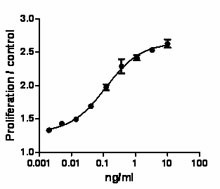- Regulatory Status
- RUO
- Other Names
- Interleukin-3, Burst promoting activity, Eosinophil colony stimulating factor (Eo-CSF), Hematopoietic cell growth factor (HCGF), Mast (MGF/MCGF), Multi-colony stimulating (Multi-CSF), P cell stimulating activity (PCSA), Thy1 inducing factor

-

M-NFS-60 cell proliferation induced by mouse IL-3.
| Cat # | Size | Price | Quantity Check Availability | ||
|---|---|---|---|---|---|
| 575502 | 10 µg | $206.00 | |||
| 575504 | 25 µg | $347.00 | |||
| 575506 | 100 µg | $692.00 | |||
| 575508 | 500 µg | $2097.00 | |||
IL-3 is the most potent growth factor for basophils followed by granulocyte-macrophage colony-stimulating factor and IL-5. These cytokines also act on mature basophils through specific receptors, thereby mediating adhesion, migration, and releasability. IL-3 is highly expressed by mast cells, and rapid and large amount of autocrine IL-3 production is responsible for mast cell survival by IgE in the absence of antigen. IL-3 has also been implicated in the pathogenesis of several chronic inflammatory diseases, including asthma, atherosclerosis, and neurodegenerative disorders, such as multiple sclerosis.
Product Details
- Source
- Mouse IL-3, amino acids Ala 27 - Cys 166 (Accession# NM_010556), was expressed in E. coli.
- Molecular Mass
- The 140 amino acid recombinant protein has a predicted molecular mass of 15673.7 Da. The DTT-reduced protein migrates at approximately 16 kDa and the non-reduced protein migrates with slightly greater mobility by SDS-PAGE.
- Purity
- >98%, as determined by Coomassie stained SDS-PAGE.
- Formulation
- 0.22 µm filtered protein solution is in 10 mM NaH2PO4 pH 7.2, 0.15 M NaCl.
- Endotoxin Level
- Less than 0.01ng per µg cytokine as determined by the LAL method.
- Concentration
- 10 and 25 µg sizes are bottled at 200 µg/mL. 100 µg size and larger sizes are lot-specific and bottled at the concentration indicated on the vial. To obtain lot-specific concentration and expiration, please enter the lot number in our Certificate of Analysis online tool.
- Storage & Handling
- Unopened vial can be stored between 2°C and 8°C for up to 2 weeks, at -20°C for up to six months, or at -70°C or colder until the expiration date. For maximum results, quick spin vial prior to opening. The protein can be aliquoted and stored at -20°C or colder. Stock solutions can also be prepared at 50 - 100 µg/mL in appropriate sterile buffer, carrier protein such as 0.2 - 1% BSA or HSA can be added when preparing the stock solution. Aliquots can be stored between 2°C and 8°C for up to one week and stored at -20°C or colder for up to 3 months. Avoid repeated freeze/thaw cycles.
- Activity
- ED50 = 0.05 - 0.200 ng/ml, corresponding to a specific activity of 0.5-2.0 x 107 units/mg, as determined by the dose dependent stimulation of a M-NFS-60 cell proliferation assay.
- Application
-
Bioassay
- Application Notes
-
BioLegend carrier-free recombinant proteins provided in liquid format are shipped on blue-ice. Our comparison testing data indicates that when handled and stored as recommended, the liquid format has equal or better stability and shelf-life compared to commercially available lyophilized proteins after reconstitution. Our liquid proteins are verified in-house to maintain activity after shipping on blue ice and are backed by our 100% satisfaction guarantee. If you have any concerns, contact us at tech@biolegend.com.
- Additional Product Notes
-
View more applications data for this product in our Scientific Poster Library.
- Product Citations
-
Antigen Details
- Structure
- Cytokine
- Distribution
-
Activated T cells, Th1, Th2, mast cells, eosinophils, keratinocytes, NK cells, and endothelial cells.
- Function
- Interleukine-3 is a pleiotropic factor which promotes both self-renewal and differentiation of early multipotential progenitors and is involved in inducible hematopoiesis in response to infections. IL-3 stimulates colony formation of megakaryocytes, neutrophils, and macrophages from bone marrow cultures.
- Interaction
- Erythroid cells, megakaryocytes, neutrophils, eosinophils, basophils, mast cells, monocytic lineages
- Ligand/Receptor
- Heterodimer IL-3Rα (CD123) and two alternate β-subunits, AIC2A binds IL-3 and is specific to IL-3Rα, AIC2B (CDw131) shared in common with IL-5R, GM-CSFR.
- Cell Type
- Hematopoietic stem and progenitors
- Biology Area
- Stem Cells
- Molecular Family
- Cytokines/Chemokines
- Antigen References
-
1. Kohno M, et al. 2005 Blood 105:2059-2065.
2. Valent P and Dahinden CA, et al. 2010 Curr Opin Hematol 17:60-66.
3. Kleemann R, et al. 2008 Cardiovascular Research 79:360-376.
4. Murphy JM and Young IG, et al. 2006 Vitam Horm 74:1-30. - Gene ID
- 16187 View all products for this Gene ID
- UniProt
- View information about IL-3 on UniProt.org
